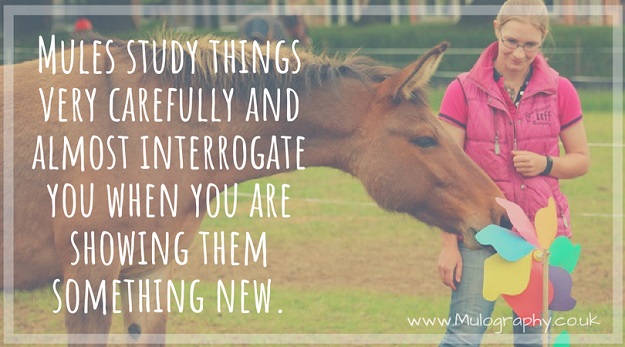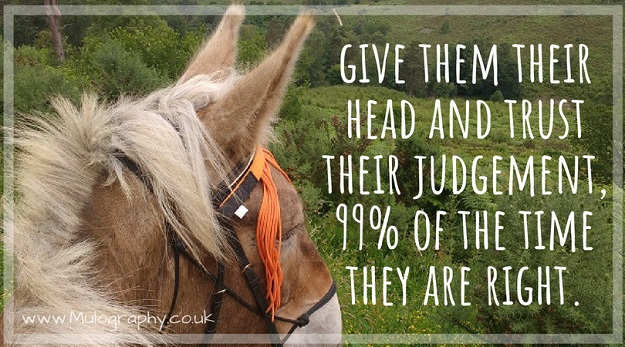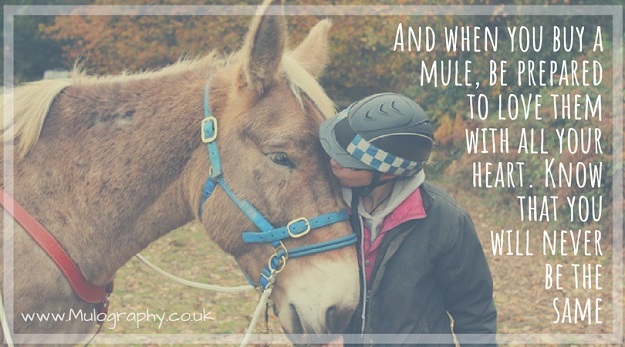On a couple of occasions lately, I’ve found myself wishing I had a single page of advice to direct new mule owners to; all the Mule Tales have specific newcomer advice at the end, but I felt as though suggesting that people check out one page was slightly less self-promoting than pointing them towards an entire gallery. Only just, though.
Anyway, in the spirit of “I’ve been outside working in 30+ degree heat all week and we’ve just got the August run of the magazine packed up and mailed out and also Marty’s been a particularly annoying egglord lately so I have zero energy left”,here’s some lazy content where I’ve just reappropriated some good advice found in the Mule Tales. Enjoy!
Be Aware Of Their Sensitivity
“The most important thing I have learned is just how different mules are to horses; far more intelligent but intelligent at being a mule. She is fast, and agile, and rarely makes a mistake, she only does anything by consent. She studies things very carefully and almost interrogates you when you are showing her something new. Having just one mule triples the IQ of a herd of seven horses. The only advice I can give would be to accept that mules are very sensitive and emotional creatures.”
— Sarah Weston, author of No Fear, No Force: A Guide to Handling and Training Unhandled and Semi-Feral Foals in an Ethical and Gentle Way and owned by Henrietta
Have A Sense Of Humour
“I think the most important thing I’ve learnt as a mule owner is to never try and deceive a mule. I’ve learnt more from my mule than any horse and one piece of advice I would give a new owner is sometimes they behave like horses sometimes they behave like donkeys and sometimes they behave like mules – so be open minded and have a sense of humour!”
— Sarah Hemmings, the welfare officer for the British Mule Society, and owned by Honey
Don’t Lose Your Patience
“The most important thing is not to lose your patience. If you are in a no win situation walk away. Charcoal was quite nappy at first especially when she lived alone if we came across other equines. A few times I just had to tie her up (to something solid) and take a time-out!”
— Ruth Bickford, long-term mule owner who trained with Meredith Hodges, and owned by Charcoal
Find Out As Much As Possible About Mules First
“The advice I would give to someone that was thinking of getting a mule would be to find out as much as possible about your purchase and about mules, have patience and most of all have fun and enjoy your mule.”
— Jacqui Tilley, BMS committee member, owned by Polo, Chico, and many others!
Be Polite
“Some advice … well, just be sure that you are ready to be scanned by your mule. Be ready to stay humble and to be polite. When you ask for something, they think faster than you and they are smarter than you. Be ready to have a lot of “NO! I will not do that if you don’t wait for me to understand and figure out what you want … I will do it if I am able, if I feel good, and if I have some interest too”. That’s why I am more about educating children than just letting them ride … for children, the mules are the best teacher for them to learn some respect of animals.”
— Le continent des Mules, an (almost) all mule therapy centre and riding school in Belgium
Mules Are Not The Same As Horses
“Mules are so different from horses and donkeys. I have owned 2 donkeys for almost 10 years now, but that’s not the same as mules. I have had horses for over 25 years, but mules are different. They have the best of the horse and the best of the donkey in them, of that I’m sure. All our mules have pieces from mother horse and father donkey … incredible animals. And advice … hmmmm … never give up? Try at least a few times again, and seek help if something doesn’t work out.”
— Nathalie Leplang, proprietor of Hepscheid Longear Trails, and owned by Tizanes (amongst others!)

Mules Cannot Be Rushed
“If I had to give one bit of advice to people thinking of getting a mule, it would be get to know one first. They really are SO different to a horse. Almost more like a cow crossed with a Labrador! They are incredibly people-orientated (like a Labrador) and push into physical pressure (like a cow). They are very methodical in their learning and absolutely cannot be rushed. Ever. So when training one, always needs to be armed with lots of time and a great sense of humour. I’ve often heard it said that there are many mule people who used to be horse people, but you’ll never find a horse person who used to be a mule person. I now know why. I’m 100% sold on my long-eared critter.”
— Kim Rhind, who bred her own mule, Banjo (Banjo also has his own Facebook page!)
Build One New Skill Each Year
“Listen to your mule. And remember, mules (as all equine) tend to communicate silently. They use other means of communication such as movement patterns, head tosses, and even looking at you out of the corner of their eye. The piece of advice I would give to a new mule owner is to take your time and let your mule grow into the skills s/he needs. You will never strong arm a mule into doing anything. Pound for pound they are stronger than horses and smarter. Give your mule time to watch; to think about something. Build one new skill each year. Many mules can be ridden into their 40s so you have lots of time to develop a strong and meaningful partnership with your long-eared friend.”
— Joan Burlingame, adventure rider and my mule inspiration, who is owned by Buckshot
Consider Why You Want A Mule
“If you are new to mules, ride someone else’s well-trained mules first. Think about why you want a mule. If it is because you want to brag about your horsemanship skills being good enough for mules, do not buy one. If you are fascinated by them and think they are ‘neat’ do not buy one. If you spend time with mules, have decades of experience training horses, and can afford to get a well-trained mule that has been treated well, then it’s a good idea to get a mule. Traumatised mules and unhandled mules are a double-whammy in my opinion, and in some ways I did not have the tools I needed to deal with a traumatised mule like Jo. We did ok because I was so good about watching her and backing off when needed. But certainly she was NOT a good ‘husband horse’ nor was I able to ‘train her for a few months and sell her.’ If you buy a mule, know that it can be difficult to rehome them because fewer people are capable of handling them. If you breed a mule, be prepared to handle him or her every single day. I hear that good mules are great and bad mules are terrible. Certainly things with mules can be more intense and require greater precision from their handlers! Mules can be a terrific adventure, but be prepared to invest a very large portion of your energy into them. Having a part-time job is probably a good thing. Also, research mule specific tack, and mule specific care. Worming them is much more complex and can lead to colic, they have different kinds of worms that they are vulnerable to, require different saddles, and are often silent colickers – too stoic for their own good. Find a reputable mule vet before you buy a mule. And when you buy a mule, be prepared to love them with all your heart. Know that you will never be the same.”
— Brie Hoblin, who supported us with thoughtful advice right from the beginning, and who was owned by Jo
Trust Their Judgement
Give them the same respect you would a horse, they deserve the same treatment. There is a big misunderstanding with them and some people actually ask you to move, as their horse does not like the smell of mules – hummmm, my horse had no problem! I think the horses pick up on the human vibes. Oh, and trust him like never before – he knows best. Someone said to me he will take care of me and take me to the finish. I thought ya right BUT I’ll be damned he did … give them their head and trust their judgement, 99% of the time they are right.”
— Eve Blumenfield, endurance rider, who completed the 2016 Tevis Cup on Ears
Never Stop Learning
“The most important thing to learn about mules … there is so much! Learn WITH your mule, read, watch, ask and never think you know everything because your mule will prove you wrong! LOL!”
— Karin Usko, who brought her mule Juanita home from El Salvador to California

And this great list by Django‘s person, Candace:
The most important things I have learned as a new mule owner are:
a) Remember that ear positioning is very different from a horse. If a mule (or donkey) walks up to you with its ears back, it’s not a bad thing! Often, it’s a form of begging. Observe what your mule is saying! As well, butt presentations are often a solicitation for scratching.
b) They are NOT stupid, so if they appear to be acting that way, stop and review your approach. Another tip that works for me is to ask for a response, and if no response or the wrong one, turn your back and ignore the animal. This works better if there is another animal to turn to. Suddenly little Dunce Cap is doing algebra to bring attention back to himself.
c) Don’t hesitate to make mistakes, or worry about the mule ‘holding a grudge’. If the mistake is honest, and you apologize (yes, I mean that), they will forgive. I was hesitant to discipline initially, thinking of this old wives’ tale. I no longer hesitate, and have no problem.
d) Don’t hesitate to try clicker training. How much better is it to have them think it is their idea?
e) Don’t drill. Don’t overtrain a mule, or they will find ways to make it more interesting.
f) Help your mule to succeed. Start and end each training with cues and tasks they like to do,so they anticipate training and working with you. Some love praise, snacks or scratches. Find what makes your mule happy, and have fun letting him train you … to stand politely on a mounting block while they pick you up, to dutifully stand with their halter while they catch you at the gate. We humans have so much to learn!



I really enjoyed this article! I’ve had horses for many years, and I got my first mule-a yearling Molly named Jolene-in October. I’ve learned so much in the 9 months that I’ve had her. There were times when I wondered what I’d gotten myself into, but I love the bond and relationship we’ve created through a lot of patience on both of our parts! Thank you so much for sharing your blog!
Hi Joann, I’m so glad you enjoyed the blog! I know what you mean about questioning what you’ve got yourself into – I’ve been there myself, but does mean that the relationship which comes out of it is all the sweeter. Mules are excellent teachers. 🙂